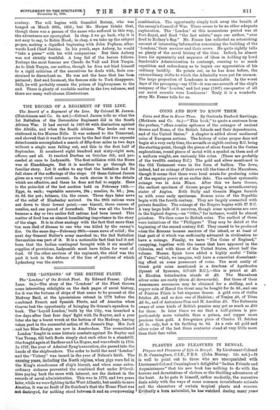THE •LONDONS ' OF THE BRITISH FLEET.
The Londons' of the British Pleat. By Edward Fraser. (John Lane. 6s.)—The story of the 'Londons ' of the Fleet throws some interesting sidelights on the dark pages of naval history, for it was the fortune of ships of that name to be present at the Medway Raid, at the ignominious retreat in 1778 before the combined French and Spanish Fleets, and off America when Graves lost the opportunity of bringing De Grasse's squadron to book. The 'Loyall London,' built by the City, was launched a few days after that four days' fight with De Ruyter, and a year later she lay a burnt wreck at the bottom of the Medway, having taken part in the successful action of St. James's Day. Her Jack _ and her Blue Ensign are now in Amsterdam. The resuscitated London' fought in some historic combats against De Ruyter and Van Tromp, till both fleets simply shot each other to a standstill. She fought again at Barflenr and La Hogue, and was rebuilt in 1704. In 1757, the year of Admiral Byng's execution, she passed into the hands of the shipbreakers. The order to build the next 'London.' -and the 'Victory-' was issued in the year of Nelson's birth. The nsning years, including the North regime, when pigs were fed in -the King's storehouses off ship's biscuit, and when some extra- -ordinary sickness prevented the combined fleet under D'Orvil- liars paying back the score with interest, are the darkest in the records of naval administration. This was in 1779, and two years later, while we were fighting lathe West Atlantic, but unable to save America, it was no fault of De 0 aichen's that the Home Fleet was _not destroyed, for nothing stood between it and an overpowering
combination. The opportunity simply took away the breath of the enemy's Council of War. There seems to be no other adequate explanation. The 'London' at this momentous period was at Port-Royal, and fired "the last salute," says our author, "ever fired to Rodney's flag." Mr. Fraser has collected an astonishing amount of interesting 'information concerning the building of the Londons; their services and their crews. He quite rightly tells us plenty of the naval history of the time. Indeed, he almost loses his equanimity and sequence of ideas in holding up Lord Sandwich's Administration to contempt, running to so much repetition and redundancy as to impair our appreciation of his ordinary lucidity. He points out, as he has done before, the extraordinary shifts to which the Admiralty were put for seamen. The large proportion of Londoners is remarkable. In the worst days of the pressgang—say 1779—it was one-seventh of the ship's company of the London,' and last year (1907) one-quarter of all our naval recruits were Londoners ! Truly it is a wonderfu story Mr. Fraser tells for us.
































































 Previous page
Previous page